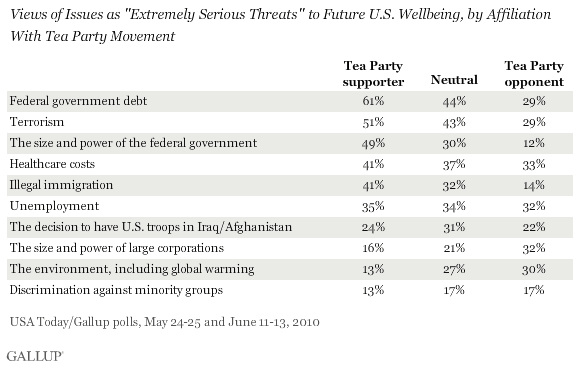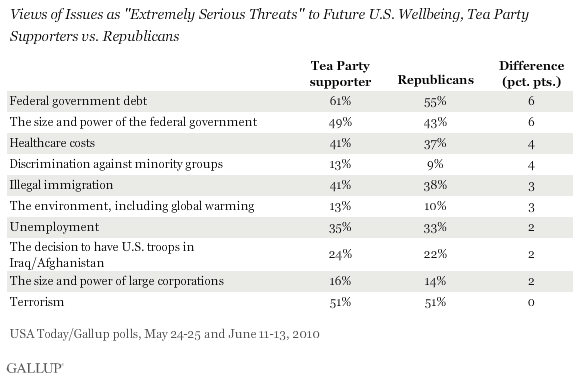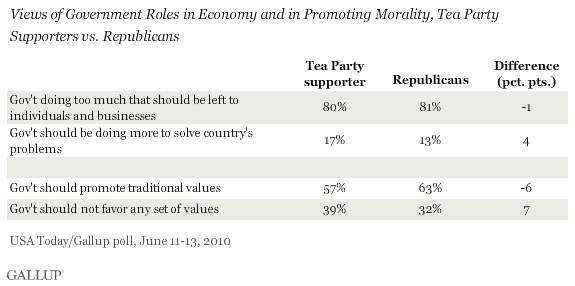PRINCETON, NJ -- Self-described Tea Party supporters differ from those neutral or opposed to the movement on the issues they perceive as threats to the future of the United States, most notably federal government debt and the size and power of the federal government. They are essentially indistinguishable from those who do not support the Tea Party in their perceptions of unemployment and racial discrimination as future threats to the country.

Tea Party supporters' heightened concerns about federal debt help make that issue the top perceived threat among all Americans. At the same time, the size and power of the federal government is only a middling concern among the general public.
Thirty percent of Americans identify as Tea Party supporters, 28% are opponents, and 36% are neutral to the movement, according to combined data from three USA Today/Gallup polls conducted in March, May, and June 2010.
The Tea Party movement has been the focus of media attention during the past year, and has had some success in getting its preferred candidates nominated or elected in the 2009-2010 election cycle. However, as Gallup has pointed out, those who describe themselves as Tea Party supporters are in many ways indistinguishable from, and largely a subset of, Republican identifiers more generally.
As a result, Tea Party supporters' issue concerns are not decidedly different from those of Republican identifiers. The two groups differ only slightly in their views of federal government debt and the size and power of the federal government among the 10 issues tested.

Tea Party Supporters Adamant About Role of Government
Tea Party supporters' concerns about government power are apparent, as 8 in 10 say the government is doing too much that should be left to individuals and businesses. Those who are neutral toward the movement are far less likely to hold this view, and Tea Party opponents reject it.

Tea Party supporters are much more unified in their views of the government's role in economic matters than in matters of morality. Just over half of supporters believe the government should promote traditional values. And though the Tea Party's concerns seem more grounded in economic issues, its supporters are significantly more likely than those neutral or opposed to the movement to want government to promote traditional values.

Tea Party supporters and Republicans more generally hold nearly identical views on government power in the economy, and largely similar views on the role of government in promoting traditional values.

Bottom Line
Americans who say they support the Tea Party movement share a common concern about government and its scope, particularly with regard to deficit spending. Their views do set them apart from those who are neutral or opposed to the Tea Party movement, but hardly distinguish them from supporters of the Republican Party more broadly.
Still, the more active elements of the Tea Party movement have succeeded to some degree in pushing the Republican Party more to the right this year by working to nominate candidates more to their liking. The fate of these candidates, such as Rand Paul, Sharron Angle, and Marco Rubio, in the fall elections will go a long way toward determining the future influence of the Tea Party movement, both in the Republican Party and the larger U.S. political system.
Results for this USA Today/Gallup poll are based on telephone interviews conducted May 24-25 and June 11-13, 2010, with a random sample of 2,063 adults, aged 18 and older, living in the continental U.S., selected using random-digit-dial sampling.
For results based on the total sample of national adults, one can say with 95% confidence that the maximum margin of sampling error is ±3 percentage points.
For results based on the total sample of 697 Tea Party supporters, one can say with 95% confidence that the maximum margin of sampling error is ±4 percentage points.
Interviews are conducted with respondents on landline telephones (for respondents with a landline telephone) and cellular phones (for respondents who are cell phone-only). Each sample includes a minimum quota of 150 cell phone-only respondents and 850 landline respondents, with additional minimum quotas among landline respondents for gender within region. Landline respondents are chosen at random within each household on the basis of which member had the most recent birthday.
Samples are weighted by gender, age, race, education, region, and phone lines. Demographic weighting targets are based on the March 2009 Current Population Survey figures for the aged 18 and older non-institutionalized population living in continental U.S. telephone households. All reported margins of sampling error include the computed design effects for weighting and sample design.
In addition to sampling error, question wording and practical difficulties in conducting surveys can introduce error or bias into the findings of public opinion polls.
For more details on Gallup's polling methodology, visit https://www.gallup.com/.
